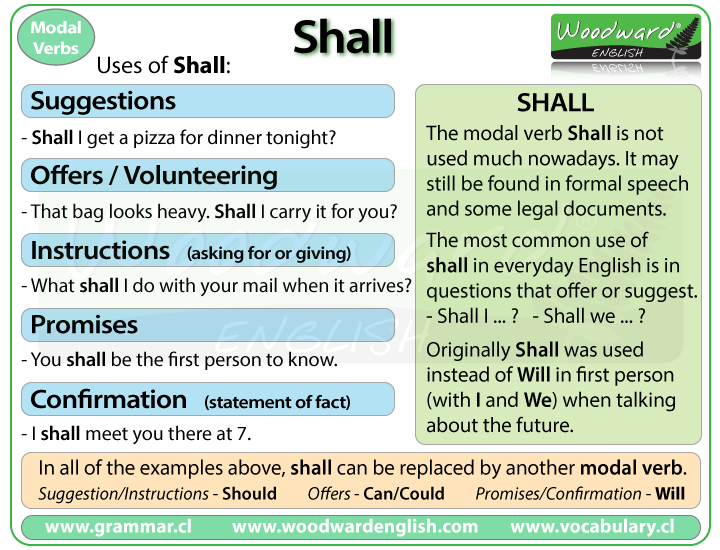Shall
English Grammar - Modal Verbs
SHALL
Shall is not used very much nowadays and mostly in formal speech and some legal documents. Originally Shall was used instead of Will in first person (with I and We) when talking about the future. Now almost everyone uses Will with all subjects.
Nowadays, the most common use of shall in everyday English (although not in American English) is in questions that serve as offers or suggestions: "Shall I ...?" or "Shall we ...?"
Situations where Shall is still occasionally used:
1. Suggestion
Notice how each of these can easily be replaced by should.
- Shall I get a pizza for dinner tonight?
- Shall we take a taxi home?
- It's cold. Shall I close the window?
- Shall we go now?
2. Offers / Volunteering to do something
- That bag looks heavy. Shall I carry it for you?
- Shall I wait for you?
- I shall make the arrangements for you.
3. Instructions (asking for or giving)
- What shall I do with your mail when it arrives?
- I shall meet you there at 7.
- You shall not pass! (said Gandalf to the Balrog in Lord of the Rings)
4. Promises
- You shall be the first person to know. (= I promise that you will be the first person)
- I shall get you a new bike for your birthday.
5. Confirmation (Statement of Fact)
Notice how each of these can easily be replaced by will.
- I shall turn 30 next week.
- We shall know the results of the exam next week.
- I shall meet you there at 7.
6. Formal written regulations and rules
This is very formal and normally avoided in spoken English. The passive is most often used in this situation.
- A record shall be kept of all students arriving late to class (= school regulations)
- Members of the board of directors shall be elected annually (= company regulations)
The Negative of Shall
The negative of shall is shall not (= will not). The contraction of shall not is shan't (= won't). It is very rare to hear this used nowadays though you may find it written in older texts.
- I shan't let the children bother you.
Shall in Question Tags
Shall is used in questions tags when the main verb is Let's.
- Let's go to the beach, shall we?
Shall Summary Chart

Next activity
See our notes about other Modal Verbs.
If you found this guide about Shall in English useful, let others know about it.
